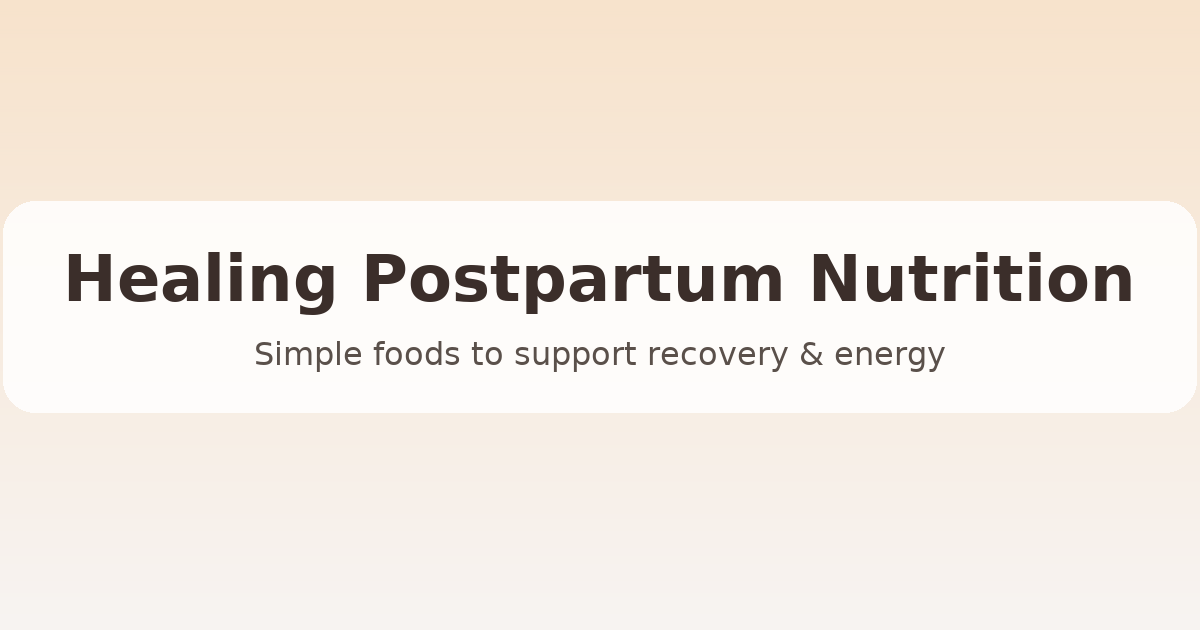
What to Eat After Giving Birth: Healing Foods for New Moms
In the whirlwind of life with a newborn, it’s easy to forget about your own meals — or grab whatever you can eat one-handed. But what you eat after giving birth can make a real difference in how you feel.
The right foods can support:
- Healing after birth or surgery
- Energy and mood (goodbye, energy crashes)
- Milk supply if you’re breastfeeding
- Hormone balance and digestion
1. Focus on Protein for Repair and Strength
Your body just did a huge job. Protein helps rebuild tissues, supports muscle strength, and keeps you feeling fuller longer.
Great postpartum protein sources:
- Eggs (easy to cook and very nutrient-dense)
- Greek yogurt or cottage cheese
- Chicken, turkey, or lean beef
- Fish like salmon or cod (watch local recommendations for mercury)
- Beans, lentils, tofu, and tempeh
Easy ideas:
- Scrambled eggs with spinach and toast
- Greek yogurt with fruit and granola
- Rotisserie chicken with pre-washed salad mix
- Lentil soup or bean chili you can reheat all week
2. Add Healthy Fats for Hormones, Mood, and Milk
Healthy fats are crucial for hormone balance, brain health, and, if you’re breastfeeding, building your baby’s nervous system.
Healthy fat options:
- Avocado (on toast, in salads, or mashed into meals)
- Olive oil and avocado oil for cooking
- Nuts and seeds (almonds, walnuts, chia, flax)
- Nut butters on toast, apples, or crackers
- Fatty fish like salmon or sardines (if recommended in your area)
Simple pairings:
- Whole-grain toast + avocado + egg
- Oatmeal topped with walnuts and chia seeds
- Carrot sticks with hummus or peanut butter
3. Choose Iron-Rich Foods to Support Energy
Many moms experience blood loss during birth, which can affect iron levels. Iron helps carry oxygen throughout your body and supports energy.
Iron-rich foods:
- Lean red meat
- Dark leafy greens (spinach, kale, Swiss chard)
- Beans and lentils
- Iron-fortified cereals or oatmeal
Pair plant-based iron sources with vitamin C (like bell peppers, oranges, or strawberries) to help your body absorb more iron.
4. Don’t Forget Fiber and Fluids for Digestion
Constipation is extremely common after giving birth, especially if you had pain medication, a C-section, or stitches. Fiber and water are your best friends here.
Fiber-rich foods:
- Fruits with skin (apples, pears, berries)
- Vegetables (broccoli, carrots, green beans)
- Whole grains (oats, brown rice, whole-wheat bread)
- Beans, lentils, and chickpeas
Hydration tips:
- Keep a large water bottle wherever you usually feed your baby.
- Drink a glass of water with every snack or meal.
- Try herbal teas (approved by your provider) if you’re tired of plain water.
5. Simple Snack Ideas for Tired New Moms
You don’t need gourmet meals to nourish yourself. Simple is perfect — especially in the early postpartum weeks.
Grab-and-go snack ideas:
- Greek yogurt cups or drinkable yogurts
- Banana with peanut or almond butter
- Cheese sticks with whole-grain crackers
- Trail mix with nuts and dried fruit
- Pre-cut veggies with hummus
Consider asking a partner, friend, or family member to prep snacks in small containers so you can grab them quickly between feedings.
6. What About Breastfeeding and Calories?
If you’re breastfeeding, your body usually burns extra calories to make milk — often around 300–500 additional calories per day. But the exact number varies a lot.
General guidelines:
- Don’t dramatically cut calories in the early postpartum weeks.
- Focus on food quality rather than strict portion control.
- Eat when you’re hungry — your body is working hard.
If you have questions about supply or weight changes, a lactation consultant or dietitian who works with postpartum moms can be a huge help.
7. Supplements: Talk to Your Provider
Many providers recommend continuing a prenatal vitamin or switching to a postnatal vitamin after birth. Depending on your blood work or symptoms, they might also suggest:
- Iron (for low iron or anemia)
- Vitamin D
- Omega-3 fatty acids
Always check before starting or changing supplements — especially while breastfeeding or taking other medications.
Gentle, Realistic Postpartum Eating
Postpartum nutrition doesn’t need to be perfect, organic, or Instagram-worthy. It just needs to be:
- Regular (don’t skip all day)
- Balanced (protein + carbs + fat + fiber)
- Kind to your body (no harsh, restrictive diets)
When you’re ready to pair food with gentle movement, explore: 5 Best Gentle Postpartum Workouts You Can Do at Home. For a bigger-picture look at healing, read our main guide: Postpartum Body Recovery for First-Time Moms.